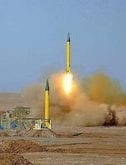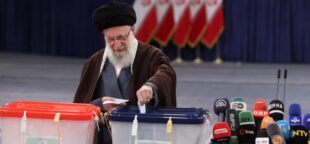iranintl – EU countries will expand Iran sanctions by adding 10 new individuals and entities linked to terror proxies and Russia’s war in Ukraine.
The EU had previously committed to intensifying sanctions against Iran following last month’s missile and drone attack on Israel, yet still hasn’t designated the Islamic Revolutionary Guard Corps (IRGC) as a terrorist organization.
Iranian forces launched their first direct attack against Israeli territory on April 13 with more than 350 drones and cruise and ballistic missiles, 99% of which were intercepted by Israel and a US-led coalition. Iran had vowed to retaliate after Israel allegedly bombed its consulate in Syria earlier in the month.
In the months following the start of the Gaza war on October 7, the Iranian government avoided direct involvement in the conflict. Until last month, it had used its proxies to target Israeli and American targets in the region, punishing America for supporting Israel’s right to defend itself following the most deadly day for Jews since the Holocaust. Over 1,200 people, mostly civilians, were killed and more than 250 were taken hostage.
A resolution adopted by the European Parliament last month following Iran’s attack on Israel urged the EU to impose further sanctions against Tehran and deem the IRGC a terrorist organization.
EU Chief Josep Borrell’s argument for not listing the IRGC is that the legal grounds have not been met. However, his claim has been dismissed by MEPs such as Charlie Weimers, a Swedish representative who called Borell “a liar” during last month’s plenary debate in Strasbourg.
Last July, two MEPs stated that the IRGC could be listed without any legal obstacles under Article 1(4) of the “Common Position 2001/931/CFSP.”
This point of view was also espoused by Iran’s exiled prince Reza Pahlavi, citing a group of French-Iranian lawyers who held the view that the European Union does not have any legal obstacles to blacklisting the Revolutionary Guards.
In 2011, the EU first introduced a sanctions regime against Iran in response to serious human rights violations in the country. The restrictive measures have been renewed annually since then and were last extended until 13 April 2025.
Since the brutal suppression of 2022’s uprising, the ongoing support for Russia’s war on Ukraine and the actions of Iran’s proxy militias, the EU has drastically increased restrictive measures, adopting at least 10 packages of sanctions.
 Shabtabnews In this dark night, I have lost my way – Arise from a corner, oh you the star of guidance.
Shabtabnews In this dark night, I have lost my way – Arise from a corner, oh you the star of guidance.



